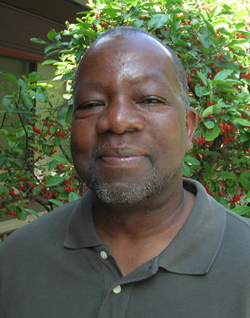
An interview with Tyrone Williams1

An interview with Tyrone Williams1
Joshua Marie Wilkinson: 2011 was a big year for you, with the release of both Howell and Adventures of Pi.
Would you mind reflecting a bit on how these books came to be, what's changed from work to work, and whether or not you continue to conceive of the book-length
work as is its own particular endeavor?
Tyrone Williams: The vicissitudes of publishing are particularly vexed in the world of small presses. I certainly hadn't planned on publishing Adventures of Pi, an old manuscript dating from the early 1980s to the early 1990s, and Howell, a book I'd conceived of and worked on, with various interruptions (e.g., On Spec), from 1998 to 2008. I sent the finished manuscript of the latter in 2009 because On Spec had just come out and I didn't know the publishing target date for Howell. Meanwhile, the Hero Project of the Century, which was supposed to have come in 2007, appeared in 2009—I was worried that it might appear with Howell, but I heard from Travis Ortiz in 2009 that he'd just started working on the production of Howell, so I figured I was safe. I didn't hear anything again until fall of 2010. Meanwhile a local Cincinnati publisher, Dos Madres, was interested in publishing those older poems, but I held off. When I didn't hear anything more from Travis at the beginning of 2011 I gave the go-ahead to Dos Madres for Adventures of Pi. Then I heard from Travis later that spring, and he informed me Howell was due for a fall release. In both cases, for both publishers, Robert Murphy at Dos Madres and Travis Ortiz at Atelos, delays were complicated by family issues. I understand; I'm just happy to have people interested enough in my work to want to publish it at all.
As for how I conceive of the work, Adventures of Pi is obviously a collection of poems, conceived as a whole, but certainly less so than Howell, which is a kind of symphony. Since completing Howell, I've been writing more normative, lyric-based poems, for a couple of new manuscripts, which are definitely in the germinating stages.
JMW: When we began this discussion back in 2008, your second book On Spec had just come out. Now that your fourth and fifth books are out, how has your process evolved? What's different for you as a writer?
TW: I still work the same way. I still collect notes, ideas, etc., in various notebooks and journals. The only project that's different is the one I mentioned in 2008, a long, fairly massive concept with Arnold Kemp. Unfortunately we both have gotten very busy—he took an academic job in the Northwest—so for now it's on hold. But I still hope to return to it someday.
JMW: What has it been like to revisit the older poems in Adventures with Pi?
TW: As always—at least for me—I am alternatively embarrassed and pleased by older poems. More than anything, though, I can still summon some of the powerful emotions driving that young man as he tries to find his way from his mid-twenties to early thirties. There is, in those poems, so much angst, so much yearning, that I wonder how he became "me"...
JMW: Can you describe your process with Arnold Kemp and what that project is like?
TW: I've had an idea for a widespread, multi-authored project built on the model of the newspaper. We would invite various artists to contribute. The model can go in several directions. We actually set up a blog to keep track of our ideas, but I wouldn't want to say much more than that right now...It's kind of a hush-hush project right now, but if it gets off the ground everyone will hear about it.
JMW: And what about this prose eulogy I've been hearing about?
TW: Brent Cunningham asked me if I had anything prosey but short for his publishing outlet, Hooke Press. I sent him a novella which I'd written in the late eighties and a eulogy/essay I'd written for anthology on Midwestern masculinity. The anthology never happened, so I forgot the essay until Brent's query. I actually thought the novella might be of more general interest, the eulogy being too "personal," but in fact he and his staff apparently loved it. I must say I have been surprised by the warm reception that little chapbook has received.
1 This interview was conducted in 2008 and first published in Denver Quarterly. Tyrone kindly answered the questions on this page via email in December 2011. What follows hereafter is from our original conversation.—JMW